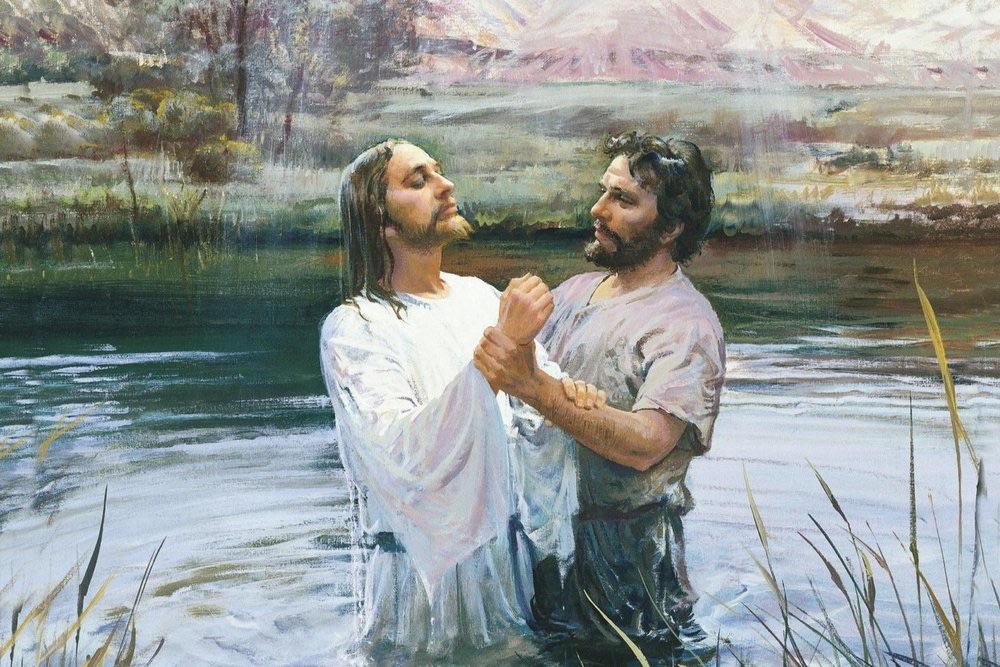Common Misconceptions about the Church of Christ
The Church of Christ is often misunderstood, and many of its practices surprise people who are unfamiliar with its teachings. One of the most notable aspects that often catches people off guard is the approach to baptism. Unlike some denominations that require a formal ceremony performed by a preacher, the Church of Christ believes in a more flexible and immediate practice.

Many people assume that a preacher must baptize them for it to be valid. This misconception stems from medieval church traditions rather than biblical teachings. In fact, the Bible does not place such restrictions on who can perform a baptism. This has significant implications for how baptism is practiced within the Church of Christ.
In the New Testament, baptism is shown as an urgent and immediate response to faith. There are numerous examples of individuals being baptized without delay, emphasizing the importance of this act as a declaration of faith and obedience. The Church of Christ follows this New Testament model, allowing for baptism to be performed at any time by any believer who understands and can teach the steps to salvation.
For those looking to deepen their understanding of faith and baptism, consider exploring How to Be a Christian: Starter Guide. This resource provides valuable insights into the foundational beliefs and practices of the Christian faith, helping new believers navigate their spiritual journey.
In the sections that follow, we will delve deeper into the specifics of baptism in the Church of Christ, the biblical basis for these practices, and other surprising aspects that set this denomination apart. We’ll also examine how these practices align with the teachings of the early church and how they can be applied in contemporary Christian life.

The Flexibility of Baptism in the Church of Christ
One of the most surprising aspects of the Church of Christ is the flexibility surrounding baptism. Unlike many other Christian denominations that often require a formal ceremony conducted by a preacher, the Church of Christ embraces a more immediate and accessible approach to this sacred act.
Baptism Anytime, Anywhere
In the Church of Christ, baptism can be performed at any time and in any place, as long as there is water and a believer willing to carry out the act. This practice is deeply rooted in biblical teachings rather than tradition. The Bible places no restriction on who can baptize; the key requirement is faith and understanding of what baptism signifies.
Matthew 28:19-20, known as the Great Commission, underscores the inclusive nature of this practice: “Therefore go and make disciples of all nations, baptizing them in the name of the Father and of the Son and of the Holy Spirit, and teaching them to obey everything I have commanded you.” This passage is directed at all believers, not just preachers, highlighting that anyone who can teach someone about salvation can also baptize them.
Breaking the Preacher-Only Myth
Many people believe that a preacher must perform the baptism for it to be valid. This belief comes from medieval church traditions, which imposed hierarchical structures not found in the New Testament. In contrast, the Church of Christ emphasizes that the ability to baptize is not confined to church leaders but extends to all Christians who understand and can teach the gospel.
For instance, Acts 8:36-38 tells the story of Philip and the Ethiopian eunuch. Upon understanding the gospel, the eunuch was baptized by Philip immediately, demonstrating that there is no need to wait for a special ceremony or an ordained minister. This story, among others in the New Testament, supports the practice of immediate baptism by any believer.
Immediate Response to Faith
Another surprising aspect is the urgency with which the Church of Christ treats baptism. In the New Testament, baptism was performed immediately upon the acceptance of faith. This sense of urgency is captured in several passages:
- Acts 2:41: “Those who accepted his message were baptized, and about three thousand were added to their number that day.”
- Acts 16:33: “At that hour of the night the jailer took them and washed their wounds; then immediately he and all his household were baptized.”
These examples illustrate that there was no waiting period; baptism was an immediate response to one’s faith in Christ. The Church of Christ follows this model, allowing baptisms to occur whenever and wherever someone decides to commit their life to Jesus.
For those exploring the significance of baptism and faith, the resource God’s Ultimate Gift: Understanding the Depth of John 3:16 provides a deeper understanding of the foundational Christian belief in salvation through Jesus Christ.
The flexibility and immediacy of baptism in the Church of Christ not only reflect a commitment to biblical principles but also ensure that this vital step in the Christian faith is accessible to all believers. This approach removes barriers and emphasizes the personal and immediate connection between an individual and their faith in Christ.
Anyone Can Baptize: Breaking the Preacher-Only Myth
One of the most common misconceptions about baptism is the belief that it must be performed by a preacher or ordained minister for it to be valid. This notion, which stems from medieval church traditions, is not supported by biblical teachings. The Church of Christ breaks this myth by emphasizing that any believer who understands and teaches the gospel can perform baptisms.
Biblical Basis for Non-Preacher Baptism
The New Testament provides numerous examples of baptisms being performed by believers who were not necessarily preachers or ordained ministers. These instances highlight the inclusive and immediate nature of baptism in early Christian practice.
- Acts 8:36-38: Philip, who was not one of the twelve apostles, baptized the Ethiopian eunuch immediately after teaching him about Jesus. This story demonstrates that understanding and willingness to teach the gospel are the key qualifications for performing a baptism.
- Acts 2:41: On the day of Pentecost, about three thousand people were baptized after accepting Peter’s message. The sheer number of baptisms suggests that the apostles likely enlisted the help of other believers to perform the baptisms, further supporting the idea that any Christian can baptize.
- Acts 16:33: The Philippian jailer and his household were baptized immediately after believing in Jesus. This urgency and inclusivity in baptism underscore that the act is not confined to church leaders.
These examples from the Bible illustrate that baptism is an act of faith and obedience to the teachings of Jesus, rather than a ritual requiring clerical authority.
Practical Implications for Modern Believers
Understanding that any believer can baptize removes barriers and makes the process more accessible. This approach encourages immediate response to faith and aligns with the practice of the early church. It also empowers Christians to take an active role in evangelism and discipleship, as they can both teach and baptize new believers.
For those looking to deepen their understanding of the Great Commission and its implications, Finding Hope in Truth: A Christian Guide to Sin, Salvation, and Redemption offers valuable insights into the broader context of Christian teachings and salvation.
Empowering Believers through Baptism
By emphasizing that any believer can perform a baptism, the Church of Christ highlights the responsibility and privilege of all Christians to share their faith and help others take this important step. This practice fosters a sense of community and mutual support among believers, as they actively participate in each other’s spiritual journeys.
This inclusive approach is also reflected in other aspects of worship and community life within the Church of Christ. For example, the emphasis on Sunday worship and communion, as discussed in Gathering in His Name: Why Sunday Worship and Communion Matter, illustrates how the Church of Christ seeks to emulate the practices of the early Christian community.
Breaking the myth that only preachers can baptize reinforces the Church of Christ’s commitment to biblical teachings and the inclusive nature of the Christian faith. It empowers all believers to take an active role in their faith and the faith journeys of others, ensuring that baptism remains an accessible and immediate response to belief in Jesus.

Immediate Baptism: No Waiting Period
A significant aspect of the Church of Christ that often surprises people is the practice of immediate baptism. Unlike many denominations that schedule baptismal services weeks or months in advance, the Church of Christ follows the New Testament model of baptizing individuals as soon as they express their faith in Jesus Christ.
Biblical Precedents for Immediate Baptism
The New Testament is replete with examples of individuals being baptized immediately upon their decision to follow Christ. This urgency underscores the importance of baptism as a step of obedience and faith.
- Acts 2:41: “Those who accepted his message were baptized, and about three thousand were added to their number that day.” The immediate response to Peter’s preaching on the day of Pentecost highlights the importance of not delaying baptism.
- Acts 8:36-38: The Ethiopian eunuch, upon understanding the gospel, asked Philip, “Look, here is water. What can stand in the way of my being baptized?” Philip baptized him immediately.
- Acts 16:33: “At that hour of the night the jailer took them and washed their wounds; then immediately he and all his household were baptized.” The Philippian jailer and his family were baptized without delay, even in the middle of the night.
These examples illustrate that in the early church, baptism was treated with a sense of urgency and immediacy, reflecting its significance in the Christian faith.
The Practice of Immediate Baptism Today
In line with these biblical precedents, the Church of Christ practices immediate baptism. When someone decides to follow Christ, they are baptized as soon as possible, often immediately after a Bible study or during a worship service. There is no waiting period, special ceremony, or requirement for a preacher to perform the baptism.
This practice ensures that the individual’s commitment to Christ is acknowledged and affirmed right away, reinforcing the importance of baptism as an essential step in the journey of faith. It also removes any barriers or delays that might prevent someone from being baptized.
For those exploring the deeper meaning of baptism and the urgency associated with it, God’s Ultimate Gift: Understanding the Depth of John 3:16 offers profound insights into the significance of accepting Jesus and being baptized.
Contrasting Practices in Other Denominations
Many other Christian denominations schedule baptismal services weeks or even months in advance. This can sometimes lead to a disconnect between the decision to follow Christ and the act of baptism. While these scheduled baptisms can be meaningful and ceremonial, they differ significantly from the immediate response seen in the New Testament.
Benefits of Immediate Baptism
- Immediate Affirmation: The individual’s commitment to Christ is recognized and celebrated right away, providing immediate spiritual affirmation.
- Biblical Alignment: This practice aligns closely with the New Testament examples of immediate baptism, maintaining fidelity to early Christian traditions.
- Removal of Barriers: By allowing any believer to baptize and performing baptisms immediately, the Church of Christ ensures that logistical or hierarchical barriers do not hinder someone’s journey of faith.
The practice of immediate baptism in the Church of Christ highlights the urgency and significance of this step in the Christian faith. By following the New Testament model, the Church of Christ ensures that new believers can immediately affirm their commitment to Christ, fostering a deeper and more immediate connection to their faith.
For further exploration of the implications of immediate baptism and the Great Commission, Finding Hope in Truth: A Christian Guide to Sin, Salvation, and Redemption provides valuable context and understanding.
The Great Commission and Its Implications
The Great Commission, found in Matthew 28:19-20, is a cornerstone of Christian doctrine and practice. It provides the basis for evangelism and baptism in the Church of Christ, emphasizing that all believers are called to make disciples and baptize them in the name of the Father, the Son, and the Holy Spirit.
Understanding the Great Commission
Matthew 28:19-20 states, “Therefore go and make disciples of all nations, baptizing them in the name of the Father and of the Son and of the Holy Spirit, and teaching them to obey everything I have commanded you. And surely I am with you always, to the very end of the age.”
This passage, spoken by Jesus to His disciples after His resurrection, outlines the mission for all Christians. It emphasizes the following key points:
- Go and Make Disciples: Evangelism is a core responsibility of every believer.
- Baptize Them: Baptism is an essential part of the process, signifying the believer’s acceptance of Christ and commitment to following Him.
- Teach Them to Obey: Discipleship involves teaching new believers to follow Jesus’ teachings and commands.
The Inclusive Nature of the Great Commission
The Great Commission applies to all Christians, not just preachers or church leaders. This universality means that any believer who understands and follows the teachings of Christ can baptize new disciples. This approach is deeply rooted in the Church of Christ’s practices and ensures that baptism is accessible to all who are ready to commit their lives to Jesus.
The article Finding Hope in Truth: A Christian Guide to Sin, Salvation, and Redemption provides a comprehensive understanding of the process of salvation and how it aligns with the Great Commission, reinforcing the inclusive and immediate nature of baptism in the Church of Christ.
Practical Implications for Baptism and Evangelism
The interpretation of the Great Commission in the Church of Christ leads to several practical implications:
- Every Believer’s Responsibility: All Christians are encouraged to share their faith, make disciples, and baptize new believers. This democratizes the process of baptism and evangelism, ensuring that it is not restricted to church leaders.
- Immediate Baptism: Following the New Testament examples, the Church of Christ practices immediate baptism. When someone decides to follow Christ, they are baptized without delay, reinforcing the urgency and significance of this step.
- Empowering Believers: By emphasizing that any believer can baptize, the Church of Christ empowers its members to take an active role in the spiritual growth of others.
New Testament Practices and Modern Applications
The Church of Christ seeks to emulate the practices of the early church as closely as possible. The New Testament provides numerous examples of immediate baptism by believers, reinforcing the importance of following this model in contemporary practice.
For those looking to explore how these biblical principles are applied in modern Christian life, How to Be a Christian: Starter Guide offers practical advice and guidance on living out one’s faith according to New Testament teachings.
The Great Commission’s call to make disciples and baptize them is central to the mission of the Church of Christ. By embracing the inclusivity and urgency of this mandate, the Church of Christ ensures that baptism is accessible to all believers and aligns with the practices of the early church. This approach not only reinforces the importance of baptism but also empowers every Christian to take an active role in evangelism and discipleship.
For more insights into the significance of Sunday worship and communion, which are also integral to the Church of Christ’s practices, Gathering in His Name: Why Sunday Worship and Communion Matter provides valuable context and understanding.
New Testament Practices and Modern Applications
The Church of Christ strives to emulate the practices of the early Christian church, with a strong emphasis on adhering to New Testament teachings. This commitment extends to various aspects of worship, community, and baptism, ensuring that modern practices align closely with biblical precedents.
Immediate Baptism in the New Testament
The New Testament provides numerous examples of immediate baptism, demonstrating the importance and urgency of this act of faith:
- Acts 2:41: “Those who accepted his message were baptized, and about three thousand were added to their number that day.”
- Acts 8:36-38: Philip baptized the Ethiopian eunuch immediately after he expressed his belief in Jesus.
- Acts 16:33: The Philippian jailer and his household were baptized without delay, even in the middle of the night.
These examples highlight the early church’s practice of baptizing new believers as soon as they professed their faith. The Church of Christ follows this model, ensuring that baptism is accessible and immediate for all who wish to commit their lives to Christ.
For a guide on how to live out these New Testament principles in daily life, How to Be a Christian: Starter Guide offers practical advice and insights.
Surprising Aspects of Worship and Community
In addition to baptism, the Church of Christ places a strong emphasis on other New Testament practices, such as Sunday worship and communion. These elements are integral to fostering a sense of community and spiritual growth among believers.
- Sunday Worship: Gathering on the first day of the week for worship is a practice rooted in the New Testament. It serves as a time for communal worship, teaching, and fellowship.
- Communion: Observing the Lord’s Supper is a key component of worship in the Church of Christ. It commemorates Jesus’ sacrifice and serves as a reminder of the unity and shared faith of the congregation.
For more on the significance of these practices, Gathering in His Name: Why Sunday Worship and Communion Matterprovides an in-depth exploration.
Teaching and Evangelism in the Church of Christ
Evangelism and teaching are central to the mission of the Church of Christ. Every believer is encouraged to share the gospel and teach others about Jesus, reflecting the inclusive nature of the Great Commission.
- Family and Children: Teaching the next generation about Jesus is a vital aspect of Christian life. The Church of Christ emphasizes the importance of instilling Christian values and teachings in children from a young age.
- Community Outreach: Engaging with the community and sharing the message of Christ through various forms of outreach is a key practice.
For insights into teaching children about Jesus and fostering Christian values in the family, Teaching Kids About Jesus: Essentials of Christian Family Values and Spiritual Development is a valuable resource.
Baptism as an Immediate Response to Faith
The practice of immediate baptism in the Church of Christ underscores the significance of responding to faith without delay. This approach not only aligns with New Testament teachings but also ensures that new believers can fully participate in the life of the church right away.
- Testimonies and Stories: Many individuals share powerful testimonies of being baptized immediately after expressing their faith, highlighting the transformative impact of this practice.
- Emotional and Spiritual Impact: Immediate baptism provides a profound sense of affirmation and belonging, strengthening the believer’s commitment to Christ and the church community.
For stories of faith and perseverance, Can’t Keep Up with God? How He Walks with Us Through Trials offers inspiring testimonies of God’s guidance through challenging times.

Embracing the Practices of the Early Church
The Church of Christ’s commitment to following New Testament practices ensures that its beliefs and practices remain rooted in biblical teachings. By emphasizing the importance of immediate baptism, the inclusivity of the Great Commission, and the centrality of Sunday worship and communion, the Church of Christ fosters a strong and faithful community.
- Exploring Further: To deepen your understanding of these practices and how they can be applied in your own life, consider resources like Scripture and Soul: How Custom Engraved Bibles Create Lasting Connections and Bible Reading Plan PDF: Chronological Order of Events for further personal study and connection with Scripture.
By embracing these practices and understanding their biblical foundations, believers can deepen their faith and live out the teachings of the early church in a modern context.
As an Amazon Associate we earn from qualifying purchases through some links in our articles.




